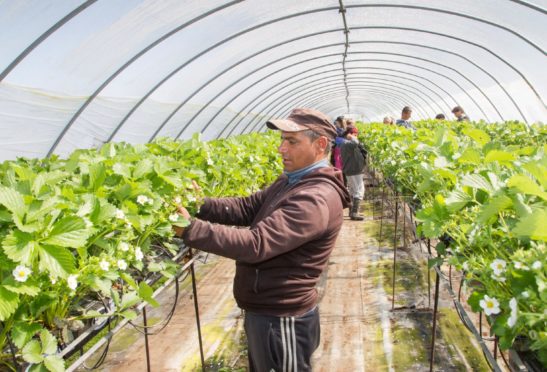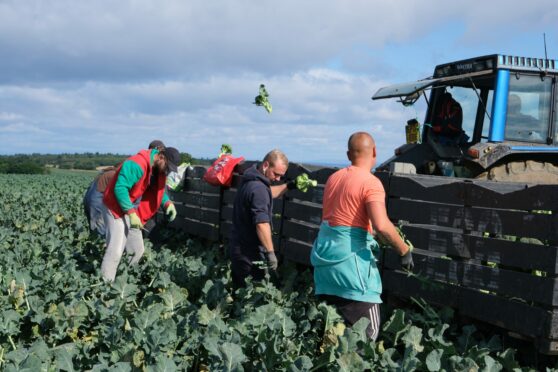Scotland’s farmers are accusing the UK Government of being completely disconnected from the agricultural industry after it announced it was scaling back the seasonal workers scheme.
Fears were raised earlier this month the country’s farmers had been unable to plan for 2022 after the UK Government delayed confirmation of the Seasonal Agricultural Workers Scheme.
Westminster finally announced an extension to the scheme on Christmas Eve (Friday), which will see 30,000 visas handed to agricultural workers until 2024.
But the scheme will see a reduction in the number of workers allowed in the second year, with the government insisting more has to be done to recruit UK workers.
NFU Scotland says the labour shortages and supply chain issues experienced earlier this year “coupled with the government’s late delivery of the seasonal worker pilot scheme” led to millions of pounds of waste and crop loss.
Farmers claimed only three domestic workers showed up for employment of the 100s of contracts offered last summer.
‘Complete disconnect’
NFU Scotland President Martin Kennedy said: “On Christmas Eve, the government has given Scotland’s fruit and veg industry deeply disappointing news about the continuation of the seasonal workers scheme.
“Keeping the number of visas for 2022 at 30,000, with the potential to increase to 40,000, is the direction the scheme should be going and should have gone further.
“However, government plans to then start tapering the scheme down from 2023 shows a complete disconnect from the industry.
“The seasonal workers visa scheme is an essential route to get the workers needed for fruit, veg and ornamental sectors.
“Plans to start dismantling the scheme are a blow and mean some very difficult decisions will have to be made about future production.
“The labour shortages encountered across the whole chain in 2021 – on farm, haulage, processing and packing – coupled with the government’s late delivery of the seasonal worker pilot scheme led to significant crop losses and millions of pounds of wastage.
“Worker shortages on Scottish farms alone were around 20%.
“Indications are that Scotland will produce a lot less fruit and veg next year and an announcement that will initially keep the number of seasonal visas for the UK static at 30,000 will not improve that picture.
“On the shift to UK staff, the Home Office continues to show huge levels of naivety on the matter despite repeated briefings from NFU Scotland and others.
“Let’s be perfectly clear, failure to secure UK workers is not for want of trying.

“Our survey of fruit and vegetable members in September 2021 found one Scottish fruit and veg business that had offered 100 contracts of employment to UK applicants — six were accepted and only three turned up to work.
“Across all businesses who completed the survey in September, the retention rate for EU and other migrant workers was over 80%.
“The retention rate for UK workers was 32%.
“Our horticultural sector punches way above its weight in Scottish agriculture, accounting for only one percent of our land area but 16 percent of our agricultural output.
“Its ongoing success is wholly dependent on securing the necessary labour.
“Alongside NFU of England and Wales, we had asked for the number of seasonal visas available to the UK in 2022 to be extended to 55,700.
“For only 30,000 to be offered at the outset in 2022 is a big disappointment.
“While that is tempered by the potential that visa numbers may rise to 40,000, the government’s stated intention is to shut down the scheme in the years ahead.
“We will survey our members again next year to identify what impact the government’s decision will have on our hugely important soft fruit, vegetable and ornamental sector in Scotland.”
Previous schemes
Scotland’s agricultural sector has been hit hard by Brexit and the Covid pandemic.
Farmers warned crops were left to “rot” because of a shortage of workers.
To address earlier concerns, a Seasonal Agricultural Worker’s Scheme was expanded to allow 30,000 overseas nationals into the UK to work, for six months, in the country’s fields.
It followed a “dismal” campaign to recruit UK staff to pick and work in the country’s agricultural sector.
It also emerged the 2020 pilot scheme was rife with exploitation.
There were numerous reports of human trafficking and modern slavery being recorded.
Government says it’s listened
Environment Secretary George Eustice said: “We had a seasonal worker scheme for agriculture from the time of the second world war and long before we joined the EU.
“We recognise that agriculture has unique and seasonal requirements for labour at harvest and have listened to our world leading fresh produce industry to understand their needs.”
Scottish secretary Alister Jack added: “The extension of the seasonal agricultural workers’ scheme is really good news for Scotland’s farming industry, ensuring growers can meet their staff needs while they work to future-proof the agricultural sector.
“The scheme will help raise wages in the sector which, along with improved conditions, will help make agriculture more attractive to domestic workers.”

